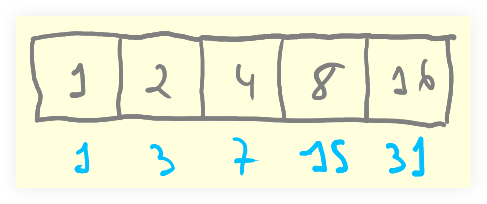Common Lisp¶
v1 non-optmized recursion loop¶
This solution uses a more traditional approach of looping over each square and accumulating the previous values.
The solution for total is exactly the same as the one for square, except it just adds one more accumulator for the total sum of the grains on the entire board.
Time complexity¶
, as we iterate over each square in the board once.
Space complexity¶
, as we simply use one or two integer accumulators to hold the values we need to compute.
(defparameter *board-size* 64)
;;;;
;; square :: Integer -> Integer
;;
;; Returns the amount of grains on a given square.
;;
(defun square (n)
(labels
((run (i acc)
(if (= i n)
acc
(run
(+ i 1)
(* acc 2)))))
(run 1 1)))
;;;;
;; total :: Integer
;;
;; Returns the total number of grains on a board of *board-size* squares.
;;
(defun total ()
(labels
((run (i acc sum)
(if (= i *board-size*)
sum
(run
(+ i 1)
(* acc 2)
(+ sum (* acc 2))))))
(run 1 1 1)))v2 with base 2 powers¶
Did you notice that the number of grains on the board squares are 1, 2, 4, 8, 16, 32..., are all powers of 2?
Let’s consider a board of 5 squares:

The blue indexes are the square number. Notice how how if we use 2 as the base, and raise that base to each of the boards’s square number minus 1, we get the number of grains on that specific square?
So we could write square like this:
(defun square (n)
(expt 2 (- n 1)))And for the total grains on the whole square, consider this:
And then compare with the sum from each adjacent square:

Notice each square sum with the previous number of grains on the previous squares is just 1 less than the powers from to .
Therefore, we can implement a solution like this for total (for a board of 5 squares):
(defun total ()
(- (expt 2 5) 1))Finally and from the explanations above, we can have the full solution for the challenge.
Time complexity¶
since we don’t loop any longer and perform the whole computation with a couple of math operations.
Space complexity¶
since we simply return the result of the computation without requireing any temporary memory space.
(defparameter *board-size* 64)
;;;;
;; square :: Integer -> Integer
;;
;; Returns the amount of grains on a given square.
;;
(defun square (n)
(expt 2 (- n 1)))
;;;;
;; total :: Integer
;;
;; Returns the total number of grains on a board of *board-size* squares.
;;
(defun total ()
(- (expt 2 *board-size*) 1))